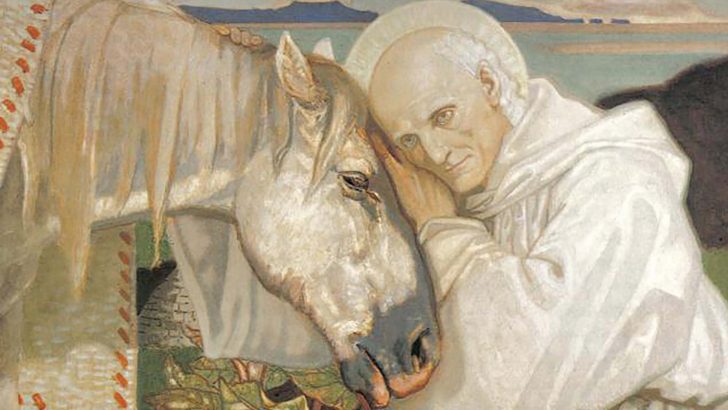This year marks the 1,500th anniversary of the birth of St Columcille according to tradition
To commemorate this significant date in the history of Ireland and Scotland, a group of supporting institutions and authorities have come together to encourage a wide range of events of all kinds across Ulster and Alban, from Derry to Inverness, and to other places with which the saint’s biography and legend have connection. Of course, the present sanitary conditions may well interfere with some of the great ideas already proposed, and it seems others are still coming into the organisers.
Alone
Almost alone, thanks to his first biographer Adomnán, St Columcille emerges as a real person of religious and personal complexity. He is not a pale figure of traditional piety, but a personality that comes off the pages with a powerful presence.
True that in his times we still seem to be in a world of piety, mysticism – and even a brief introduction of an ‘aquatic beast’ in the River Ness – but there is also an impression of nation-building, with the Irish stretching out to conquer and colonise the south west of Scotland and come in conflict with the Picts. As the Picts soon vanished from history a cloud hangs over their decline and disappearance, though some would say they were simply extirpated by the incoming Irish who on the ruins of the old tribal lands established a new nation, not just a fragment of Dál Riada, but of the Scottish nation (‘Scots’ being then the word for Irish) began as an Irish imperial adventure. The Irish in the role of invaders, colonists, and imperialists is not one that we ever dwell on.
On this island the focus will be on the city of Derry. But there are many other things to look out for too in a great many other places that intended to be enjoyed free of restriction.
Display
Though most people connect Columcille with Iona and with the Book of Kells, in the Library of the Royal Irish Academy (in normal times) can be seen on display (free of charge, entry merely by ringing on the doorbell) The Cathach of Columcille, the saint’s ‘battle book’ which miraculously survived the hazards of faith and war. Though not the magnificent work of art like the volume kept in Trinity, it is in some way a more moving historical relic.
Back in 2002, the Cathach was published in CD-ROM format by the academy. Each vellum page of the Cathach has now been digitised for the Irish Script on Screen project for publication online later in 2021. In August and September the RIA will be organising a lecture series exploring for the public it and other manuscript materials relating to the saint’s life (details in due course from the academy’s website).
It may well be that these events will stimulate both unionist and republican interest in the emergence of Ulster and Scotland as nations, and their centuries-old connections.
When the people of Co. Antrim and Co. Down speak about ‘the union’ they do not have in mind a union with Surrey and Sussex (which they hardly ever think about), but with Clydeside and Argyll. Can a new basis of a larger union be built on these foundation between Ulster today and Scotland, who knows?
The steering group ‘Columcille 1,500’ will be overseeing all the events from the mountains of Co. Donegal eastward. These are all being arranged as required for internet participation. The schedule, as it stands now, and as it will develop, are worth exploring.
Lockdown
If lockdown persists we may not be able to travel in person, but there will be quite unlimited scope of the imagination, for those who have already visited Iona, scope for memory.
One summer afternoon, long, long ago, my brother and I took the ferry across the sound between the Mull and Iona. The brief voyage was like floating in air over a silver strand some 20 feet blow, so clear was the water. It was quite magical, like some forgotten scene out of the Voyage of St Brendan (who indeed came here too): entrancing and delighting the heart and soul.
Let’s hope health and weather this summer stay fine for us.
These are the contact details for Columcille 1,500:
Foras na Gaeilge, 2-6 Queen Street, Belfast; +44 (0)28 9089 0970.
Foras na Gaeilge, An Chrannóg, Na Doirí Beaga, Gaoth Dobhair, Co. Donegal, F92 EYT3; (+353) 074 9560113/9560114.


 Peter Costello
Peter Costello St Columba bidding farewell to the White
Horse (1905), by John Duncan (1866-1945)
- a very common legend of Celtic saints
associated with friendly animals.
St Columba bidding farewell to the White
Horse (1905), by John Duncan (1866-1945)
- a very common legend of Celtic saints
associated with friendly animals. 